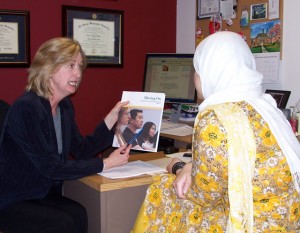By Matt Sinclair ’90
Add one unhealthy person to a household, and soon everyone is infected. In a broad sense, the same thing can happen in society.

Nancy Freeborne-Brinton ’83 (left) advises one of her international students.
An awareness of that possibility informs the daily work of Nancy Freeborne-Brinton ’83, assistant professor and undergraduate program director, Department of Global and Community Health, George Mason University. With a focus on improving public health, she guides students as they seek to make a difference in local and global health initiatives.
For her talent, Freeborne-Brinton has been named one of the top 10 academic advisers two years in a row, in a universe of 2,375 full- and part-time faculty. Students submit nominations for the award, which is sponsored by the university’s Student Academic Affairs, Advising and Retention Office.
She models her teaching philosophy on her experience at Lafayette, where she notes the greatest value was “getting to know her professors.” So now, even though she teaches in a large university, she strives to offer students the same kind of personal attention. She teaches biomedical ethics, issues and trends in health care, and health promotion/disease prevention.
The demand for individuals trained in public health has grown rapidly. GMU’s undergraduate program in community health was founded in 2006.
“About five years ago, there were five students in the program. Now there are 288,” says Freeborne-Brinton.
The program differs from individual or clinical health ones.
“It’s about trying to make the whole population healthy,” she says.
For example, public health advocates advance smoking cessation programs and work as wellness coordinators in corporations. Some seek to address the obesity epidemic in the United States, while others hope to improve childhood well-being in Africa, where millions die before they reach the age of 2.
A biology graduate, Freeborne-Brinton began her career in public health as a physician assistant, after earning a second bachelor’s degree from George Washington University’s physician assistant program. Later she returned to the institution and earned a master’s in public health in health administration and doctorate in public health in health behavior.
“Lafayette was a great place to be mentored,” she adds. “I was very involved in student government, which helped me in understanding the rights of students, so I try to allow my undergrads to be active and participate in things on campus.”
She co-chaired the student government’s health and security committee and lobbied to allow PAs to see patients at Bailey Health Center.
Sam Brinton ’14, her son, a civil engineering major, is enjoying his experience at the College. She and Sam both had a class with Howard Schneiderman, professor of sociology.
“I used some of Professor Schneiderman’s readings in my doctoral dissertation,” she says. “He still influences my work.”
She also fondly recalls Bernard Fried, Kreider Professor Emeritus of Biology.
“He has influenced countless students,” she says. “He was a nonjudgmental faculty member who allowed us to do biology research. He was so enthusiastic and wanted everyone to have a piece of the pie.”
Although she has conducted research and enjoyed her time working directly with patients, Freeborne-Brinton, who previously taught at Yale and GWU, primarily sees herself as a teacher and academic adviser.
Fried and Schneiderman understood what their students needed to succeed. And, in a sense, Freeborne-Brinton takes a similar approach when it comes to public health.
“It’s not just science,” she says. “You need to understand people to be able to help them learn to be healthy.”
